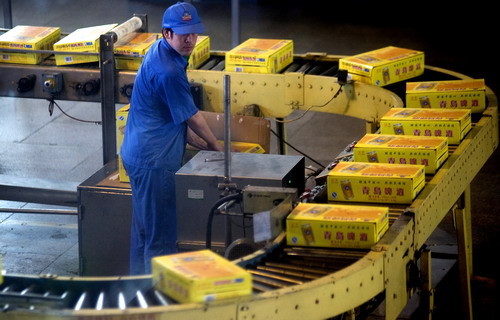Tsingtao Beer to open brewery in Thailand
|
||
|
China's brewery giant Tsingtao Beer announced on Monday that it plans to set up its first overseas plant in Bangkok, the capital of Thailand, as a significant step towards globalization for the century-old brand, which was introduced by the Germans 108 years ago. The plant, which will begin operations in early 2013 with an estimated total investment of $100 million, will have an annual production output of 200,000 liters and will create hundreds of local jobs, said Jin Zhiguo, chairman of Qingdao, Shandong-based Tsingtao Brewery Co Ltd. The company's branch in Thailand, operating as Tsingtao Beer (Thailand) Co Ltd, will be the sixth-largest brewery in terms of production output in the world. "The exploration of the Southeast Asian market will be the first stop for Tsingtao beer in the quest to expand to European and Oceania markets," Jin said. "It is a solid step towards multinational management after careful preparation and accumulation." The establishment of the Thai plant aims to ride on the enormous market volume and growing demand. "Thailand has an important geographical location among the 10 ASEAN countries, with a complete market economic system, an open investment environment and a climate for all-year-round beer consumption," Jin said at a signing ceremony on Monday morning in Bangkok. The brewery exports beer to more than 70 countries around the world. The overseas plant is expected to expand its market share in the Southeast Asian and European markets, according to a statement from the company. Jin said the company's first step towards internationalization traced back 100 years ago, when the British and German merchants brought yeast and beer-making techniques to Qingdao. Three years later, the beer company won a gold medal at the Munich Beer Festival. The Thai project marks another step towards further capital internationalization and the globalization of resource allocation and supply chain management. "Localized production for local supply will provide greater efficiency in management and supply chain, improve product freshness and quality, and enhance international competitiveness," Jin said. "It is the time to go global to introduce our beer to different countries. We want Tsingtao beer to penetrate people's lives through the value we create to local consumers, communities and governments," Jin said. Economic and cultural exchanges between China and Thailand have been growing rapidly, laying the foundation for Chinese companies to invest in Thailand, said Li Qun, the mayor of Qingdao. Local sources said beer consumption in Thailand has been on the rise along with growing tourism. "As a world-renowned brand, Tsingtao beer enjoys a great reputation among the Thai people for its century-old traditions of beer making. The project will bring us not only quality beer, but also advanced technologies and management methods, thus contributing to our nation's beer industry," Witoon Simachokedee, permanent secretary of Thailand's Ministry of Industry, said at the ceremony. The project will likely benefit Thailand's agricultural industry, as Thailand abounds with rice, an important raw material of beer. Zhang Yi, associate professor of the University of International Business and Economics in Beijing, said emerging markets, including China and ASEAN (Association of Southeast Asian Nations), are the latest battlefields for global brands. "Emerging markets not only have a great potential for consumption, but also provide favorable policies and preferential tariffs, which can bring concrete benefits to companies," he said. "After Tsingtao Beer establishes its branch in Thailand, tariffs can be avoided, logistics can be shortened and freshness of the beers can be guaranteed. It will lower tax rates for Tsingtao Beer in the Southeast Asian markets," Zhang added. Chinese investment in Thailand has been growing. China invested $830 million in Thailand in the first eight months of this year, exceeding last year's total investment, said Guan Mu, Chinese ambassador to Thailand. He added that bilateral trade reached $49.4 billion in the first nine months of this year. Wu Binbin contributed to this story. |
| Tools: Save | Print | E-mail |
|
| Comment |





